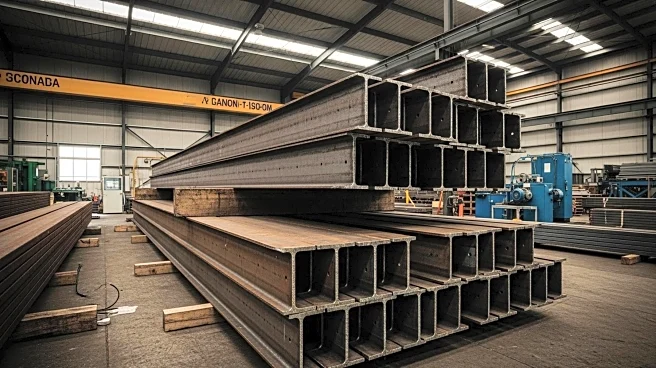What's Happening?
The European Union has proposed a significant reduction in its tariff-free quota on steel imports, effectively imposing higher tariffs on steel from countries such as China, India, Turkey, and the United Kingdom. The new quota is set at 18.3 million tons, with imports exceeding this amount facing a 50% tariff, doubling the current rate of 25%. This move is intended to protect European steel manufacturers from an influx of imports, which have been redirected due to high tariffs imposed by the United States earlier this year. The proposal, which aims to support Europe's traditional steel industry, requires ratification by the European Parliament and the European Council. The UK has expressed concerns, warning that these measures could severely impact its steel industry, which heavily relies on exports to the EU.
Why It's Important?
The EU's proposal to increase tariffs on steel imports is significant as it aims to shield its domestic steel industry from global overcapacity and competition. This move could have substantial economic implications, particularly for the UK, whose steel industry is already under pressure. The UK exports a large portion of its steel to the EU, and the increased tariffs could lead to a decline in exports, threatening jobs and the viability of the industry. Additionally, the proposal highlights ongoing trade tensions and the potential for further trade disputes, as countries affected by the tariffs may seek to retaliate or negotiate exemptions. The decision underscores the EU's strategic focus on maintaining industrial competitiveness and economic security.
What's Next?
The proposal will undergo scrutiny and potential amendments by the European Parliament and the European Council. Discussions with the World Trade Organization may also be necessary to address the impact on member countries. The UK is currently in discussions with the EU to mitigate the potential negative effects on its steel industry. The outcome of these negotiations will be crucial in determining the future of UK-EU trade relations in the steel sector. Additionally, the proposal will be a topic of discussion at an upcoming meeting of trade ministers from the Group of 20 countries, where broader trade implications may be addressed.
Beyond the Headlines
The EU's decision to impose higher tariffs on steel imports reflects broader concerns about global trade imbalances and the need for strategic autonomy in key industries. The move could lead to a re-evaluation of trade policies and alliances, as countries affected by the tariffs may seek new markets or negotiate trade agreements to offset the impact. The proposal also highlights the challenges of balancing economic protectionism with the principles of free trade, as well as the potential for increased trade tensions in an already volatile global market.










